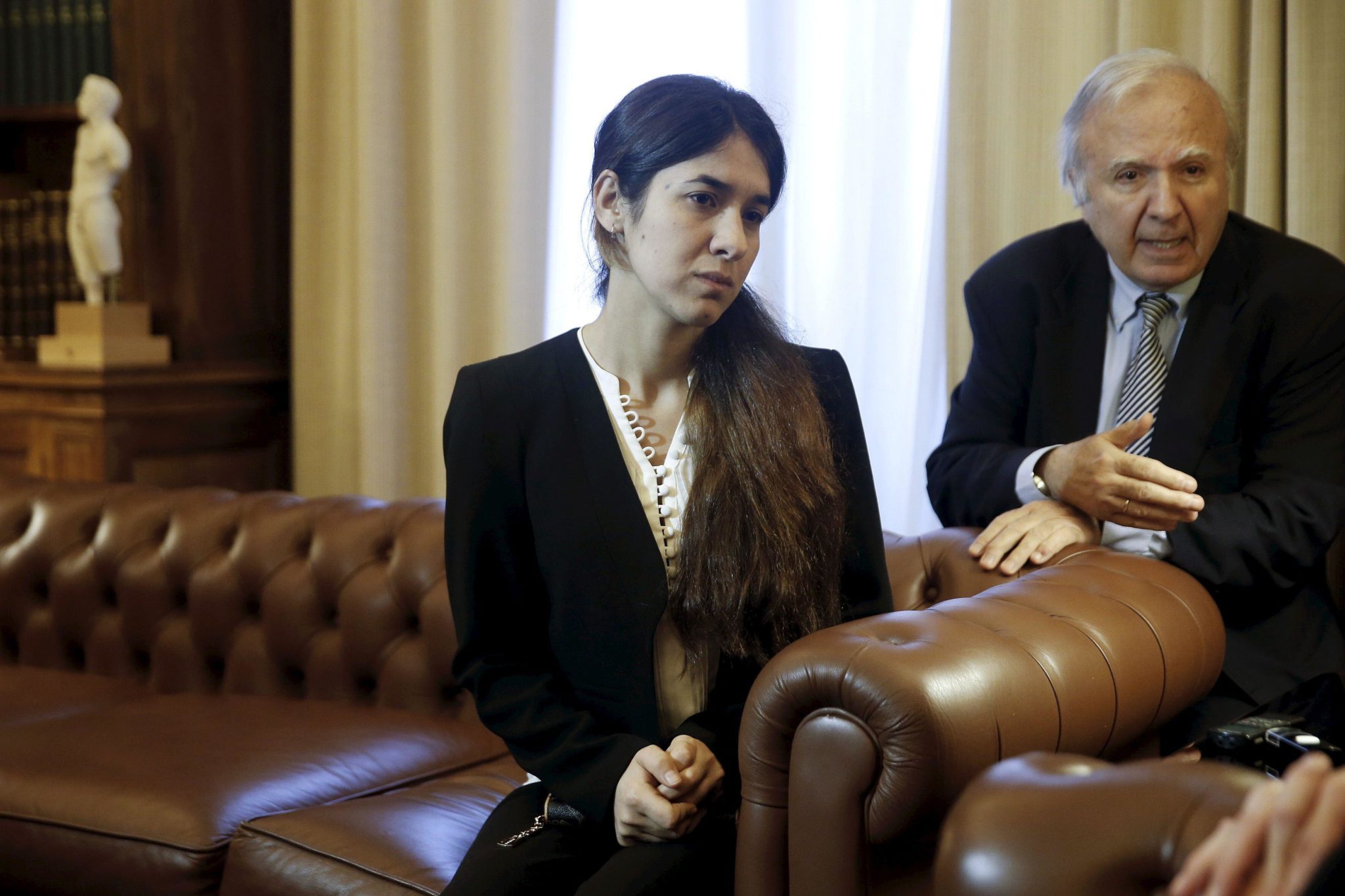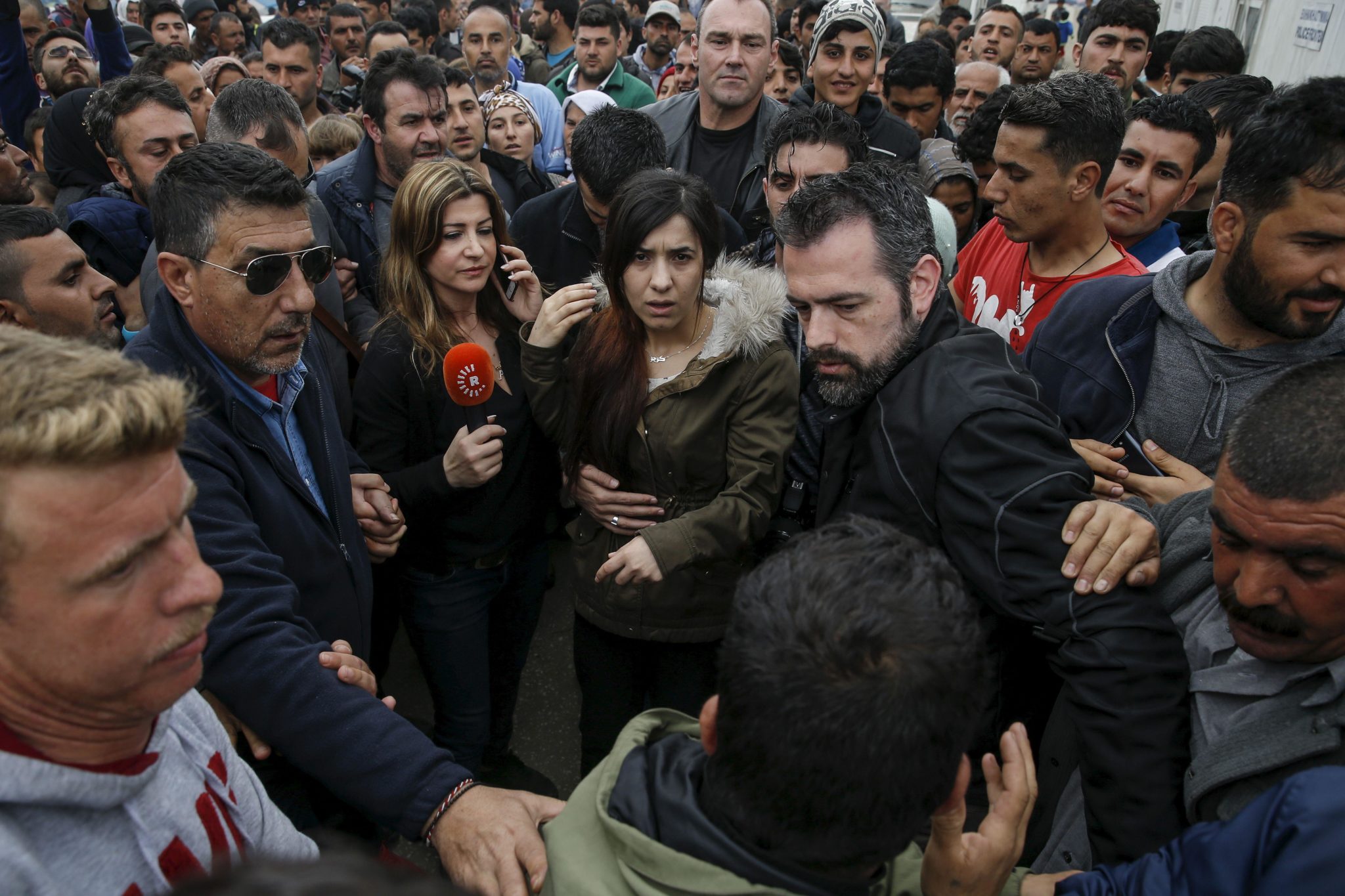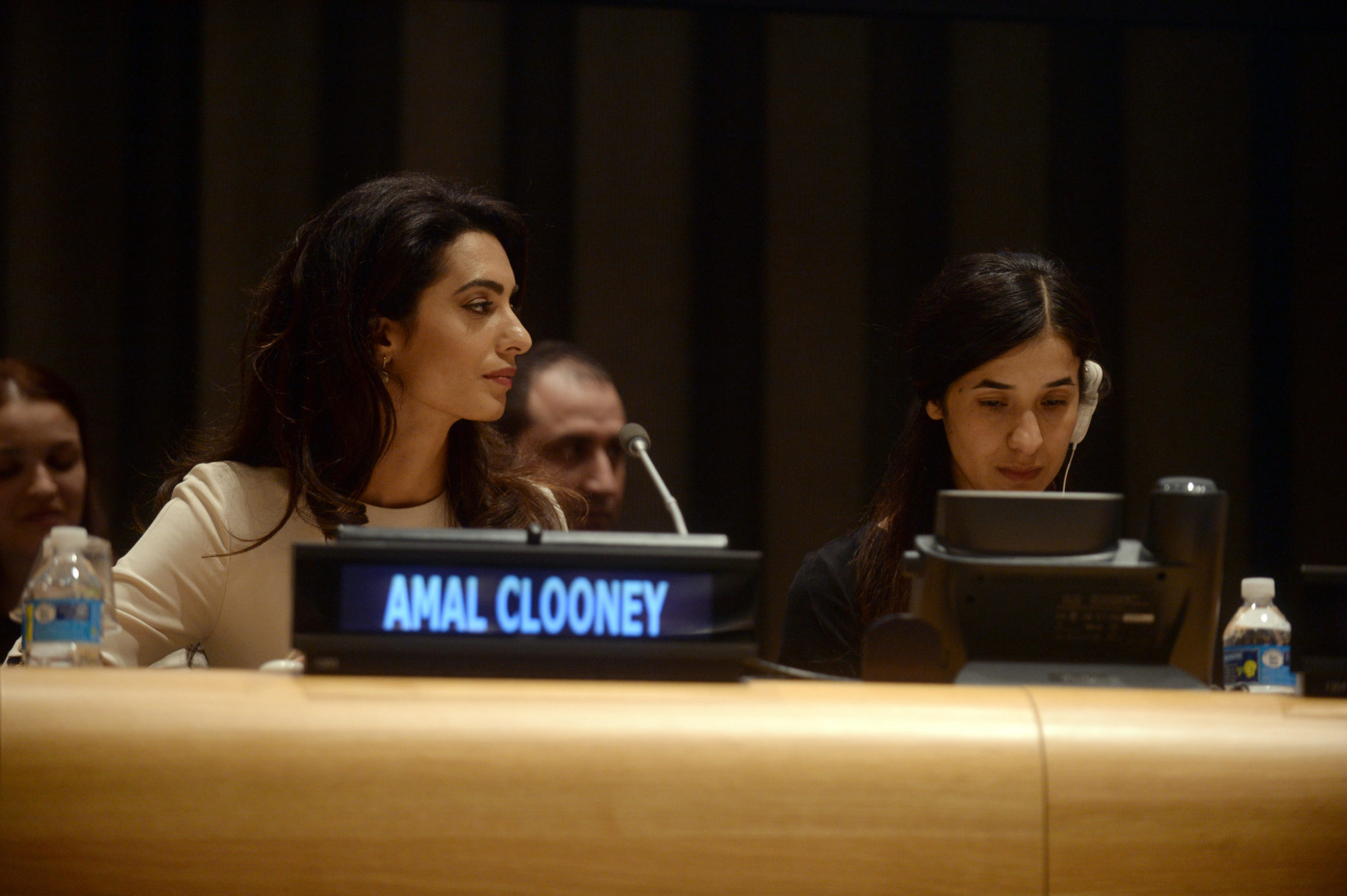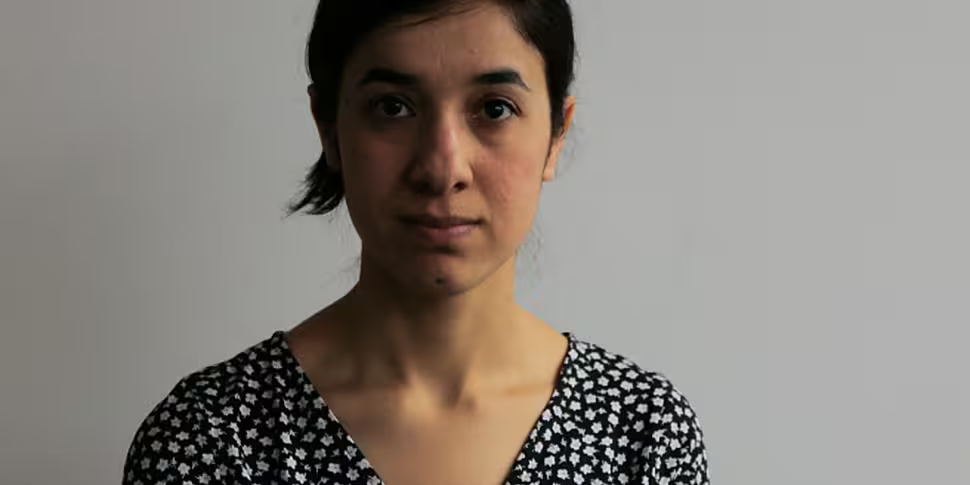When Nadia Murad addressed the United Nations earlier this year, she made it clear she had never wished for such a central position on the global stage.
Aged just 19-years-old, she lost her home, her country, her family and her future to the mindless violence of ISIS extremists.
She was among thousands of women kidnapped, sold and repeatedly raped by ISIS fighters, before - after three months of unimaginable hardship - she made her escape.
Now, in her role as UN Goodwill Ambassador for the Dignity of Survivors of Human Trafficking, she travels country to country calling on the world to recognise the genocide inflicted on the Yazidi people.
Slight, soft spoken and fiercely determined, she told heads of state at the UN Security Council she was, "not raised to give speeches.”
“Neither was I born to meet world leaders, nor to represent a cause so heavy, so difficult,” she said.
The recipient of repeated ISIS death threats, she has vowed to continue speaking out, “so that one day we can look our abusers in the eye in a court in The Hague and tell the world what they have done to us.”
Persecution
The Yazidis are a religious community, based mainly in northern Iraq, whose beliefs combine elements of several ancient Middle-Eastern cultures.
More than 5,000 Yazidis have been massacred by ISIS militants in the last two years while 3,200 people are being held prisoner by the group, according to a recent U.N. inquiry.
Ms Murad was in Ireland this week, meeting the Tánaiste Frances Fitzgerald to highlight the suffering of the thousands of women still held in bondage.
 Nadia Murad Basee Taha, centre meets Greek President Prokopis Pavlopoulos (not pictured) in Athens. 30-12-2015. Image: Yorgos Karahalis AP/Press Association Images
Nadia Murad Basee Taha, centre meets Greek President Prokopis Pavlopoulos (not pictured) in Athens. 30-12-2015. Image: Yorgos Karahalis AP/Press Association ImagesSpeaking through an interpreter, she told Newstalk.com that constantly reliving the abuse she suffered is painful - but even after everything she has been through, she counts herself among the lucky - with thousands of Yazidi women and children still in captivity.
“The future of the Yazidi people depends on the free world,” she said. “It depends on whether the world will accept the injustice that is being done to us.”
Earlier this year, both the UN and the US were among the international voices to condemn ISIS’ persecution of the Yazidi as an act of genocide.
“I think the world now knows who the Yazidi are and I am hopeful that knowing all this will make governments decide to protect us and make a change,” she said.
ISIS attacks
Ms Murad was still a young student, living on her family farm in the foothills of the Sinjar Mountains when ISIS fighters began their savage campaign against her people.
A member of the Yazidi community in the village of Kocho, Northern Iraq; she attended the town’s only school, had dreams of becoming a teacher and lived what she calls, “the simple life.”
When the attack came, early in the morning of August 3rd 2014, it was an act of unspeakable brutality.
“They came with the intention of ending the Yazidi people,” she said. “To kill all the men. To take the children and enslave the women.”
The militants held the town under siege until, on August 15th, the women were separated and led to the school where they could only watch as hundreds of men and teenage boys were lined up and executed.
Six of Ms Murad’s nine brothers were amongst the victims.
“When they came, they killed any man they came across but they also killed the elderly and those who could not escape from their homes,” she said. “They burnt the houses down around them while they were still inside.”
“They killed anyone who was mentally ill. They destroyed the Yazidi temples and in some cases, they burnt people alive inside the temples.”
Only the beginning
For Ms Murad and the rest of the women, the ordeal had only begun. They were divided further, with the old separated from the young.
She and her sisters were among hundreds of others taken as sex slaves. Separated and shepherded onto buses, the women were subjected to horrific abuse on the way to ISIS territory. Her mother, she would later learn, was deemed too old and executed.
Later, separated from her sisters, Ms Murad was taken to the northern city of Mosul with a group of women and children ranging in age from nine to 28-years-old.
They were taken to a distribution centre, where girls were chained together, auctioned off and passed among groups of men. Later, when Nadia was caught in an attempt to escape; her captor gave her to his guards who beat her, raped her and burned her with cigarettes until she passed out from the pain.
“That is something that is not abnormal to ISIS; that is what they do to any woman who tries to escape,” she said.
She said security is kept tight to ensure that “escape is a dream that cannot be accomplished by anyone.”
“Perhaps if we were taken to prison, we would have waited to be released or to be liberated but no woman would accept being taken like this,” she said.
“Knowing what these people have done. For someone to come to your home, to kill your men and to take you. What they have done against your faith, against your people and against you as a person.
“To be raped, to be used and tortured by people who are dirty in their spirits, dirty in the way they look, the way they smell.
“No woman in the world would accept being treated this way. No woman can bear being used moment to moment by different people.”
Escaping ISIS
After three months in captivity, Ms Murad spotted an unlocked door and made a second bid for freedom. Terrified and lost in a city filled with ISIS supporters; she stumbled upon a family who managed to smuggle her out of the city.
“I was lucky. Most of the people that remained in the city knew what was happening,” she said.
“They knew about the crimes that ISIS was committing against women and children and they did nothing to try and stop it.
“I did not have any faith that I would be helped. Before me, many other girls tried to escape. They were caught by the population and they were returned to ISIS.”
After she was smuggled out of Mosul, Ms Murad made her way to a refugee camp in the Kurdish region of Duhok.
Conditions in the camp were “unbearable” with hundreds of other women and girls who had fled ISIS territory left with no money, food or clothing for the winter ahead.
It was in the camp she was reunited with her sister, Dimal and was introduced to Yazda, a non-governmental organisation founded to support the Yazidi people. She managed to flee as far as Germany, where she was provided safe asylum in Stuttgart.
In all, 18 of Ms Murad's family members have either died or disappeared since ISIS attacked her village in 2014.
 Nadia Murad Basee Taha walks through a makeshift camp for migrants and refugees at the Greek-Macedonian border near the village of Idomeni, Greece, 03-04-2016. Image: REUTERS/Marko Djurica
Nadia Murad Basee Taha walks through a makeshift camp for migrants and refugees at the Greek-Macedonian border near the village of Idomeni, Greece, 03-04-2016. Image: REUTERS/Marko DjuricaWhilst in Ireland, she is calling on the government to use its diplomatic clout to push for the establishment of a special international tribunal to prosecute Islamic State fighters as war criminals - and for a protected safe zone in Iraq, so the Yazidi can return home to rebuild.
The International Criminal Court was set up to prosecute crimes against humanity, however neither Iraq nor Syria are currently members and as a result; the court holds no jurisdiction unless the Iraqi government invites investigators in - or the UN Security Council sanctions an inquiry.
The council has only done so twice before - for crimes in Darfur in 2005 and Libya in 2011.
Campaign
Her campaign has gathered traction in recent months with the European Union awarding her its top human rights award - the Sakharov Prize for Freedom of Thought - at the end of October.
She was awarded the Vaclav Havel Human Rights Prize earlier that month and at the start of the year, she was nominated for the Nobel Peace Prize - which eventually went to the president of Colombia.
Nadia views the awards as an “acknowledgement of the suffering of Yazidi people” and a “profound message to the ISIS terrorist group that their criminal inhumanity is condemned.”
Her case has been taken on by human rights lawyer, Amal Clooney who in September delivered a damning speech to the UN telling the assembled representatives that she is, “ashamed as a supporter of the United Nations that states are failing to prevent or even punish genocide because they find that their own interests get in the way.”
“I am ashamed as a lawyer that there is no justice being done and barely a complaint being made about it. I am ashamed as a woman that girls like Nadia could have their bodies sold and used as battlefields," she said.
“We know that what we have before us is genocide, and we know that it is still ongoing. We know exactly who the perpetrators are. They brag. ISIS brags about its crimes online.”
 Amal Clooney attends the Women In The World reception honouring appointment of UN Office on Drugs and Crime Goodwill Ambassador Nadia Murad, 16-09-2016. Image: Storms Media Group / Alamy Stock Photo
Amal Clooney attends the Women In The World reception honouring appointment of UN Office on Drugs and Crime Goodwill Ambassador Nadia Murad, 16-09-2016. Image: Storms Media Group / Alamy Stock PhotoNadia admits that condemning the group brings them no closer to justice and she warned “the ideology that brings these terrorist groups together” needs to be addressed to deal with the militant scourge.
“The fight against ISIS is important and it is good that it is taking place but what must be addressed is the ideology that brought militants from all over the world to come and fight,” she said.
“Al-Nusra, Al Qaeda, Daesh - they all came out of the same ideology. Much of the responsibility to address that is on the Muslim countries. The ideology needs to be addressed so new groups will not appear and destroy more communities like mine.”
Brainwashing
This summer the ISIS threats against her life took on a chilling new tone when Nadia received a phone call at her home in Strasbourg from her 13-year-old nephew, Malik.
ISIS has made a practice of brainwashing the young boys it has captured and Malik is now one of the group’s fighters.
“He was not the first one to be taken and he was not the only one. There were more than 1,000 Yazidi children taken,” she said.
“When he called and he had been brainwashed, I was not surprised. That is what ISIS can do and what they are doing to thousands of children.
“He was not the Malik that we had known. He didn’t show any sympathy but we do have hope that once we have him back, he will grow into being the boy that we knew. We have faith that he will be able to recognise what ISIS is; that we will be able to save him.”
Campaigning
Ms Murad has spent much of the last few months travelling with Mrs Clooney to refugee camps throughout the Middle East and documenting the stories of the people there in order to build their case against ISIS.
Ms Murad is greeted like a hero by many young women wherever she goes. The stories she hears are heart-breaking but she is committed to fighting organisations that use terror and mass enslavement to “humiliate societies and humanity at large.”
Addressing world leaders at the UN may have become a part of her future but her message is simple - people around the world must show the courage to take a stand and ensure they are willing to speak up for persecuted people wherever they may be.
“After the Holocaust, the world decried, “never again” but yet Genocide occurs with haunting frequency,” she wrote on her website.
“What’s puzzling to me is that it occurs in full view of the world community.”
She said it was devastating to escape and know that her people have been left without a home to return to and she is haunted daily by the thought of the women and children still held in captivity in militant strongholds.
"I think they might have lost all their hope, their energy; and their souls are extinguished," she said. "Living like this, it is hard to remain truly alive - only their bodies remain after all these crimes."









